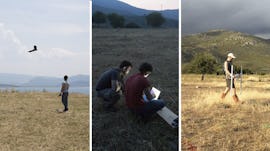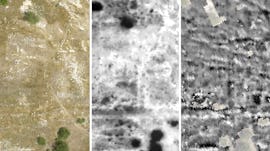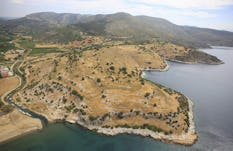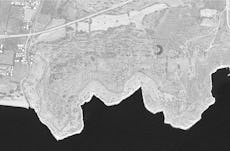Ionian Archeology, Notion, Turkey
ARCHEOLOGICAL SURVEY AND FIELD RESEARCH




The ancient Ionian city of Notion is located on a promontory along the Aegean coast of Turkey. It occupies a high plateau across two promontories on the east side of the alluvial valley of the Hales River. At the base of the site is the modern beach village of Ahmetbeyli and the sanctuary of Klaros and the ancient city of Kolophon, for which Notion served as a port, lie up the valley.
This project is an ongoing collaboration with the archaeological team undertaking research on the site, and the work has spanned across research, teaching, as well as the development of a site management plan that includes designs for a future park as well as visitor and archaeological facilities and infrastructures. Notion has not only a deep history in terms of occupation by civilizations at least as far back as historically recorded time, but also has a fascinating geological history that shaped the coastline, and is currently defined by fragile ecosystems as well as recreational and agricultural uses. Rather than focusing solely on the archaeological heritage of Notion, the design work is conceived through a material praxis that operates through intertwined archaeological, ecological, cultural, and recreational coevolution.
The context of the archaeological site can in many ways be approached as a locus of temporal conundrums and contradictions. Here, the messy entropy of comingled pasts and presents is materialized into fragmented things interrogated to speak for obscured events and configurations of space and matter. The practices of contemporary archaeological survey and excavation materialize new relations and intimacies between humans and the matter of the ground. The epistemology of imaging the shape of the past, undertaken by the archaeological team through a combination of machine vision and sensing—lidar, termal, magnetic gradiometry—in consort with minute attentiveness to material fragments and surface patterns, informs approaches and possibilities for design. Here, one of the roles of design is to both communicate the current presence of these past formations while also becoming an actor within the continual and ongoing transformation of a place. Within these contexts, the multifaceted project explores the possibilities for design as both an agent within the temporalities of the site, and as an apparatus that produces subjectivities in relation to matter, time, the environment, and technologies of mediation.
More comprehensive information regarding the Notion Project
Team
| RVTR | Kathy Velikov, Geoffrey Thün, Karen Toomasian, Dan Tish, Travis Crabtree |
| Project Director | Christopher Ratté (University of Michigan LS&A / Kelsey Archaeological Museum) |
| Associate Director | Felipe Rojas (Brown University) |